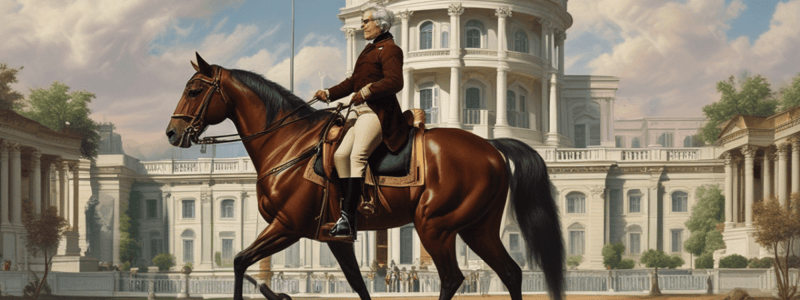Podcast
Questions and Answers
What was Nicholas Biddle's role in the Bank of the United States?
What was Nicholas Biddle's role in the Bank of the United States?
- Regulator of state banks
- Treasury Secretary
- Founder of the Bank
- Bank President (correct)
Why did the Bank of the United States need to keep gold and silver on hand?
Why did the Bank of the United States need to keep gold and silver on hand?
- To convert paper notes to hard currency (correct)
- To regulate lending policies
- To fund government projects
- To issue paper notes
What was one of the primary functions of the Bank of the United States?
What was one of the primary functions of the Bank of the United States?
- To regulate the availability of credit (correct)
- To regulate the economy
- To issue paper notes
- To provide credit to citizens
What was the significance of the McCulloch v. Maryland Supreme Court case?
What was the significance of the McCulloch v. Maryland Supreme Court case?
How did the Bank of the United States influence smaller banks?
How did the Bank of the United States influence smaller banks?
What was one of the main concerns of banks during this period?
What was one of the main concerns of banks during this period?
What was a characteristic of the economy during the Jacksonian era?
What was a characteristic of the economy during the Jacksonian era?
What was the main reason people were investing in the Bank of the United States during Jackson's years in office?
What was the main reason people were investing in the Bank of the United States during Jackson's years in office?
What was one of the reasons some people distrusted the Bank of the United States?
What was one of the reasons some people distrusted the Bank of the United States?
Why did New York bankers dislike the Bank of the United States?
Why did New York bankers dislike the Bank of the United States?
What was the significance of the election of 1832?
What was the significance of the election of 1832?
Why did Jackson veto the re-charter bill of the Bank of the United States?
Why did Jackson veto the re-charter bill of the Bank of the United States?
What was the consequence of Jackson's veto of the Bank of the United States' re-charter?
What was the consequence of Jackson's veto of the Bank of the United States' re-charter?
What was one of the causes of the financial panic of 1837?
What was one of the causes of the financial panic of 1837?
What was the result of the government's order to buy government lands with gold or silver?
What was the result of the government's order to buy government lands with gold or silver?
Flashcards are hidden until you start studying
Study Notes
The Bank of the United States
- Established by the Supreme Court case of McCulloch v. Maryland, but came under scrutiny during Andrew Jackson's first administration
- Led by Nicholas Biddle, serving as a rudimentary central bank, regulating credit availability and controlling lending policies of state and small banks
- Issued paper notes, which could be exchanged for hard currency (gold or silver), and had to maintain enough reserves to meet customer demands
- Effective in reigning in excessive borrowing and lending policies during the economic boom of Jacksonian America
Opposition to the Bank
- Opposition from those who distrusted paper currency, preferring hard currency
- Local bankers felt restricted by Biddle's oversight, hurting their business
- New York bankers resented the Philadelphia-based bank and wanted a central bank in their own city
- Concerns about the bank's monopoly and excessive power
The Election of 1832 and the Bank's Re-Charter
- Henry Clay and Biddle allied to defeat Jackson, realizing they needed each other to win
- Congress passed the re-charter bill in July 1832, but Jackson vetoed it, citing the bank's private monopoly and potential to enrich a few at the expense of the many
- The veto was a popular move, contributing to Jackson's re-election
The Demise of the Bank
- Jackson ordered the withdrawal of US deposits from the bank, leading to its eventual liquidation by 1841
- Biddle's attempts to fight back by restricting lending and pressuring Jackson failed
The Panic of 1837
- Caused by the void left by the Bank of the United States, leading to a surge in state banks and private banks offering money to finance American expansion
- Speculation and inflation led to a financial crisis, with banks calling in loans, many unable to pay, and property foreclosing
- The government's requirement for gold or silver to purchase government lands further exacerbated the crisis, leading to widespread financial ruin and panic
Studying That Suits You
Use AI to generate personalized quizzes and flashcards to suit your learning preferences.




